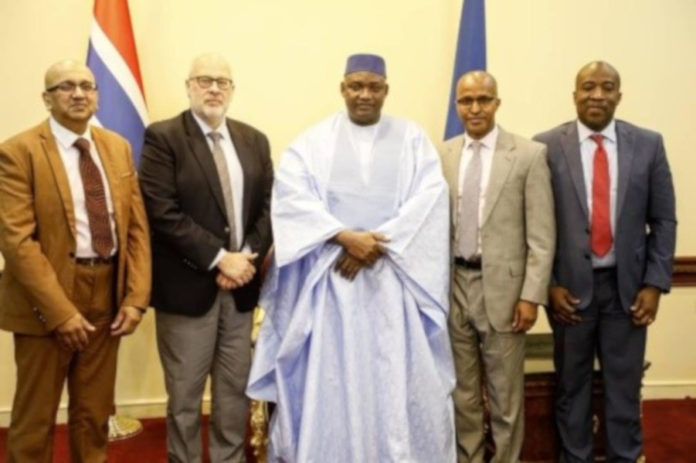By Nelson Manneh
To address the urgent balance-of-payments needs for countries across the World, the IMF Executive Board has approved financial assistance for the Gambia amounting US$21.3 million under the Rapid Credit Facility.
The country will also benefit from IMF Debt Service Relief under the Catastrophe Containment and Relief Trust.
The COVID-19 pandemic is projected to lower growth of the Gambian economy to 2.5% in 2020 and the immediate challenge is to contain the spread of the disease, strengthen medical care, implement social distancing and other containment measures and mitigate the economic impact of the pandemic especially on the most vulnerable.
According to Bernard Mendy an Economist at the IMF Gambia Office, the Executive Board of the International Monetary Fund (IMF) in Washington approved a disbursement of SDR 15.55 million (about US$21.3 million or 25% of its SDR quota) for the Gambia on April 13th 2020, under the Rapid Credit Facility (RCF) of the Fund; that financing provided under the RCF will assist the country meet its urgent balance of payment needs as well as support Government in their efforts to contain the spread of COVID-19 and limit its adverse economic and social impacts.
“The Gambia is being severely affected by the COVID-19 pandemic. While the spread of the virus in the country remains contained, Gambia remains extremely vulnerable to the pandemic due to the density of its population and a weak health system,” a release from the IMF indicated; that the economic impact of the global pandemic and related emergency measures have halted tourism, the mainstay of the country’s economy, disrupted trade and reduced remittances and private capital inflows.
“The real GDP growth projected for 2020 has been revised from 6.3% to 2.5% and the balance of payment outlook has weakened by about US$46 million or 2.4% of GDP. The immediate gross fiscal impact including revenue shortfalls due to the disruption of economic activity and the expected delay in public investment, is estimated at about 3.6% of GDP,” the release indicated; that half of this amount corresponds directly to emergency spending on healthcare and logistics and increased spending on social support, including food distribution, compensation to frontline workers and support to small businesses.
The release further indicates that emergency support to the Gambia will supplement financing from the IMF under a US$47.1 million Extended Credit Facility (ECF) arrangement for approved on March 23rd 2020; that to accommodate the worsened balance of payment outlook, the IMF Executive Board also approved Gambian authorities’ request to modify the ECF performance criteria on net usable international reserves and net domestic assets of the country’s Central Bank.
It indicates that the Gambia has also benefited from the IMF Executive Board’s decision of April 13th 2020, to provide debt service relief to all countries eligible for support from the International Development Association (IDA), in the form of grant assistance under the Catastrophe Containment (CC) window of the Catastrophe Containment and Relief Trust (CCRT); that as a result, the Gambia will receive relief from the CCRT on debt service falling due to the IMF in the next six months by about US$2.9 million; that this relief could be extended for up to two years, subject to the availability of resources under the CCRT.
Following the Executive Board discussion, Mr. Tao Zhang, Deputy Managing Director and Acting Chairperson of IMF said the global COVID-19 pandemic is straining the Gambian economy notably as international travel and tourism has been halted.
“The Gambian authorities are acting decisively to contain the domestic spread of the pandemic and mitigate its impact on the economy. The IMF Executive Board’s approval of disbursement under the RCF will help fill the urgent balance-of-payments need and augment budget resources,” Bernard Mendy said; that the authorities’ support for social programs is being severely tested.
“In this context, a better targeting and timely delivery of social assistance to the most affected households and sectors is needed during the pandemic,” he said; that the Central Bank of the Gambia should continue to monitor developments in the financial sector in order to ensure adequate liquidity and oversight while avoiding a blanket weakening of supervisory standards; that strengthening of market surveillance under the existing regulations will help detect and address appropriately, any weakening of the Central Banks’ foreign exchange positions; that maintaining a flexible exchange rate will also assist the absorption of the balance of payments shocks.
Mendy further said that this debt relief will make US$2.9 million in additional resources available to the Gambia Government in the next six months; that the relief could also be augmented up to US$10.8 million in the next twenty-four months’ subject to resource availability.





















